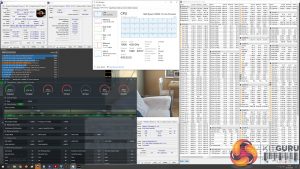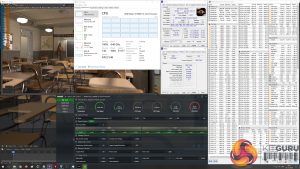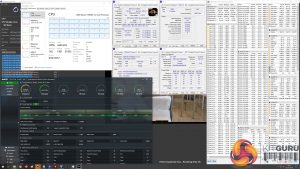Frequency, especially in all-core scenarios, was historically the area where people found issue with Ryzen 3000X/XT and Zen 2. Intel managed to push significantly higher clock speeds from its Skylake-based chips on the heavily refined 14nm process technology. That’s especially true when looking at all-core operating frequencies for Intel versus Zen 2 in power unlimited scenarios.
As such, we were hoping to see the new, optimised Ryzen 5000 chip operate at higher all-core frequencies when running at stock, PBO, and when overclocked.
Stock-Clocked Operating Frequencies:
We see the 5900X running at around 4.3-4.4GHz under an all-core load situation in the likes of Cinebench R20 and Blender. This an impressive boost clock figure for the 12-core chip directly out of the box as it is around 300MHz faster than even the 3900XT 12-core processor.
For the 5900X, we also saw clocks on a single core peaking at 4.95GHz and regularly operating above 4.85GHz and 4.9GHz. That is despite the maximum rated boost clock being 4.8GHz according to AMD's specifications.
Ryzen 9 5900X PBO Overclocking:
The 5900X in our testing ran with an all-core PBO operating clock of a little over 4.4GHz after extended periods of heavy load. This is fractionally lower than the PBO clocks we saw from the 5950X running PBO, thus implying that the 16-core chip is superior silicon (or is simply getting more juice to feed the cores).
These PBO numbers are reasonable, as the 5900X registers a solid improvement of around 50-100MHz versus its stock, Precision Boost behaviour.
Ryzen 9 5900X Manual Overclocking:
4.7GHz was the maximum stable all-core overclock we achieved with the Ryzen 9 5900X using a load delivery voltage of around 1.33V. This was tested on both the ASUS and Gigabyte motherboards with AIO and air cooling and worked very well throughout our testing.
With a good cooling solution, we think that slightly higher frequencies are likely to be achievable – we booted at 4750MHz all-core but could not maintain stability at our chosen voltage level.
For comments on Infinity Fabric overclocking and the limitations with current AGESA revision BIOSes, check out our Ryzen 9 5950X review article.
Overclocking Outcome:
We saw the same 4.7GHz all-core overclock with our Ryzen 9 5950X testing. This implies that the region of 4.7GHz with sensible voltage levels is an achievable point for Zen 2. The frequency benefits brought about from the enhanced design in the TSMC 7nm process node of the Ryzen 3000XT CPUs are present for Ryzen 5000 and look to be delivering solid clock speed behaviour.
PBO operation was good, thanks to the fact that maximum 1T boost clocks close to 5GHz are maintained. Based on our specific results, the choice of operating modes for the Ryzen 9 5900X will be around 4.4GHz multi-core and around 4.9GHz single core using PBO. Alternatively, a static 4.7GHz can be had through manual overclocking. Which behaviour better suits you will come down to individual use cases and preferences.
Be sure to check out our sponsors store EKWB here
 KitGuru KitGuru.net – Tech News | Hardware News | Hardware Reviews | IOS | Mobile | Gaming | Graphics Cards
KitGuru KitGuru.net – Tech News | Hardware News | Hardware Reviews | IOS | Mobile | Gaming | Graphics Cards





